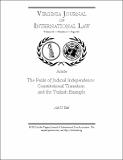| dc.description.abstract |
Reseña:The Turkish democratic experience is sometimes considered a potential modelfor transformations underway in the Arab world. In this context, it is worthconsidering how impediments to democratic consolidation took root in Turkeyand analyzing possible mechanisms for resolving tensions that block reforms.This Article illustrates how institutions that might ordinarily be expected tosecure democratic space, such as a strong and independent judiciary, may insteadserve as a constraint on political liberalization. The role of the Turkishjudiciary as the guardian of particular ideological precepts — a role that is, attimes, in tension with democratic commitments — is grounded in the history ofTurkey’s transition from imperial collapse to republicanism. Theconstitutionalization of an illiberal conception of secularism insulated foundingideological precepts from reinterpretation through ordinary politics. Thesurprising outcome in Turkey has been pro-Islamic groups that serve asaccidental liberalizers and secular elites that oppose democratization. Theparticulars of the Turkish case may be unique, but a study of elite strategies inTurkey to manage transition and institutionalize preferences yields broadlyapplicable lessons. While this study offers a cautionary note, it also identifiescontemporary sources of optimism when the focus turns from conventionalprescriptions for democratic transition to the relationships between democraticpublics and state institutions in a particular context. By analyzing theconstitutional amendments that were adopted in the 2010 Turkish referendum,The Turkish democratic experience is sometimes considered a potential model for transformations underway in the Arab world. In this context, it is worth considering how impediments to democratic consolidation took root in Turkey and analyzing possible mechanisms for resolving tensions that block reforms. This Article illustrates how institutions that might ordinarily be expected to secure democratic space, such as a strong and independent judiciary, may insteadserve as a constraint on political liberalization. The role of the Turkishjudiciary as the guardian of particular ideological precepts — a role that is, attimes, in tension with democratic commitments — is grounded in the history ofTurkey’s transition from imperial collapse to republicanism. Theconstitutionalization of an illiberal conception of secularism insulated foundingideological precepts from reinterpretation through ordinary politics. Thesurprising outcome in Turkey has been pro-Islamic groups that serve asaccidental liberalizers and secular elites that oppose democratization. Theparticulars of the Turkish case may be unique, but a study of elite strategies inTurkey to manage transition and institutionalize preferences yields broadlyapplicable lessons. While this study offers a cautionary note, it also identifiescontemporary sources of optimism when the focus turns from conventionalprescriptions for democratic transition to the relationships between democraticpublics and state institutions in a particular context. By analyzing theconstitutional amendments that were adopted in the 2010 Turkish referendum,the Article suggests that when judicial independence is combined with democraticchecks, the risks of illiberal interventionism in defense of elite privilege may bemitigated in cases of transition. |

